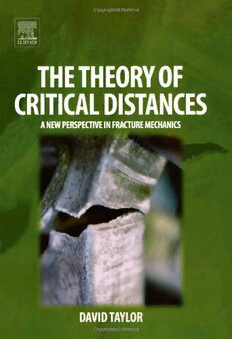Download The Theory of Critical Distances PDF Free - Full Version
Download The Theory of Critical Distances by Taylor in PDF format completely FREE. No registration required, no payment needed. Get instant access to this valuable resource on PDFdrive.to!
About The Theory of Critical Distances
Critical distance methods are extremely useful for predicting fracture and fatigue in engineering components. They also represent an important development in the theory of fracture mechanics. Despite being in use for over fifty years in some fields, there has never been a book about these methods - until now. So why now? Because the increasing use of computer-aided stress analysis (by FEA and other techniques) has made these methods extremely easy to use in practical situations. This is turn has prompted researchers to re-examine the underlying theory with renewed interest. The book begins with a general introduction to the phenomena of mechanical failure in materials: a basic understanding of solid mechanics and materials engineering is assumed, though appropriate introductory references are provided where necessary. After a simple explanation of how to use critical distance methods, and a more detailed exposition of the methods including their history and classification, the book continues by showing examples of how critical distance approaches can be applied to predict fracture and fatigue in different classes of materials. Subsequent chapters include some more complex theoretical areas, such as multiaxial loading and contact problems, and a range of practical examples using case studies of real engineering components taken from the author's own consultancy work. The Theory of Critical Distances will be of interest to a range of readers, from academic researchers concerned with the theoretical basis of the subject, to industrial engineers who wish to incorporate the method into modern computer-aided design and analysis. * Comprehensive collection of published data, plus new data from the author's own laboratories * A simple 'how-to-do-it' exposition of the method, plus examples and case studies * Detailed theoretical treatment * Covers all classes of materials: metals, polymers, ceramics and composites * Includes fracture, fatigue, fretting, size effects and multiaxial loading
Detailed Information
| Author: | Taylor |
|---|---|
| Publication Year: | 2007 |
| ISBN: | 9780080554723 |
| Pages: | 307 |
| Language: | English |
| File Size: | 2.073 |
| Format: | |
| Price: | FREE |
Safe & Secure Download - No registration required
Why Choose PDFdrive for Your Free The Theory of Critical Distances Download?
- 100% Free: No hidden fees or subscriptions required for one book every day.
- No Registration: Immediate access is available without creating accounts for one book every day.
- Safe and Secure: Clean downloads without malware or viruses
- Multiple Formats: PDF, MOBI, Mpub,... optimized for all devices
- Educational Resource: Supporting knowledge sharing and learning
Frequently Asked Questions
Is it really free to download The Theory of Critical Distances PDF?
Yes, on https://PDFdrive.to you can download The Theory of Critical Distances by Taylor completely free. We don't require any payment, subscription, or registration to access this PDF file. For 3 books every day.
How can I read The Theory of Critical Distances on my mobile device?
After downloading The Theory of Critical Distances PDF, you can open it with any PDF reader app on your phone or tablet. We recommend using Adobe Acrobat Reader, Apple Books, or Google Play Books for the best reading experience.
Is this the full version of The Theory of Critical Distances?
Yes, this is the complete PDF version of The Theory of Critical Distances by Taylor. You will be able to read the entire content as in the printed version without missing any pages.
Is it legal to download The Theory of Critical Distances PDF for free?
https://PDFdrive.to provides links to free educational resources available online. We do not store any files on our servers. Please be aware of copyright laws in your country before downloading.
The materials shared are intended for research, educational, and personal use in accordance with fair use principles.

